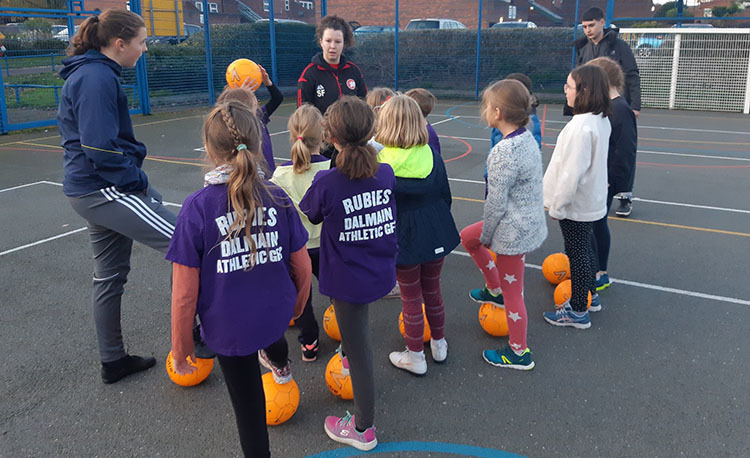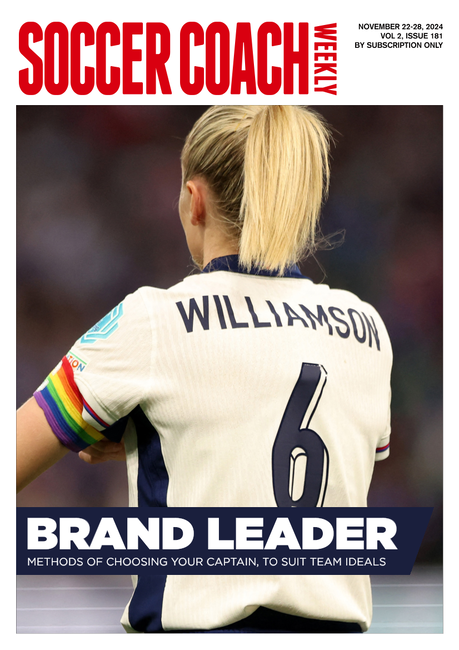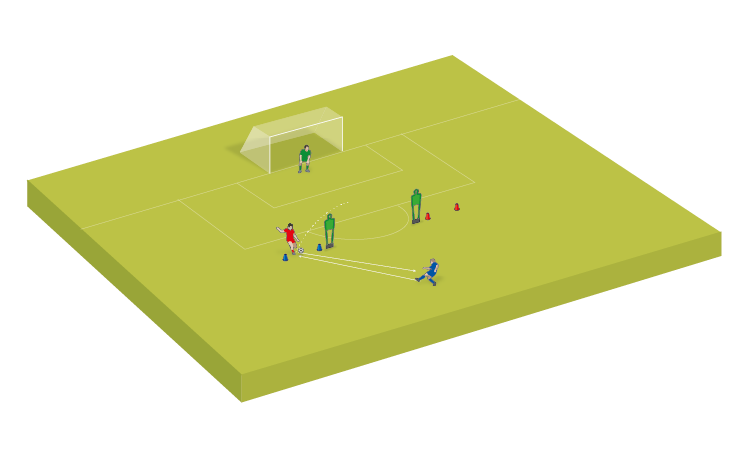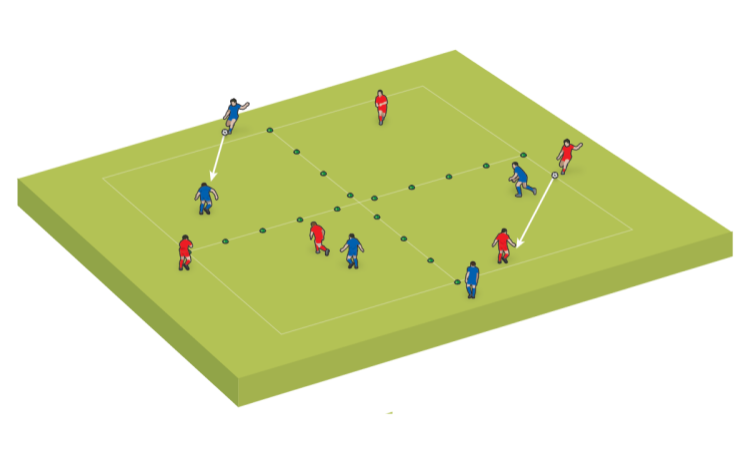How to create a parents manifesto
Coach Steph Fairbairn explains how her ’manifesto’ reduced the unhelpful touchline chatter - and hopes it will foster greater co-operation with parents
On matchdays, nine times out of ten I am the most quiet coach on the sidelines.
I try my best to do the majority of my coaching at training, and save my words on a Sunday for praise, encouragement, minor tactical changes or my half-time talk.
It’s something I’ve had to work really hard on. At first, it felt really unnatural not to loudly suggest that players ‘pass’, ‘shoot’ or ‘take them on’. In part, this is because those are the things I remember being shouted at me as a kid playing.
A few of my players have asked me about my coaching approach. Recently, we faced a team where the coach prescribed almost every single thing their players should do.
One of my defenders wondered why I "don’t tell them what to do". I told her I wanted to allow the team to make their own decisions, as that is how they learn.
Since this approach was explained to me by my FA mentors, it has made complete sense. I think back to my time playing when I was younger and wonder if I would have enjoyed it more without constant direction from the sidelines, and the pressure that direction brings.
After a two and a half month break, my team began the 2021-22 season at the end of September. I was a bit nervous for the game, feeling slightly out of practice, yet I soon fell back into the matchday pattern I had been curating over the previous two seasons.
One part of that pattern for home matches was having coaching staff and players of both teams on one side of the pitch, and parents on the other. This was an away game, and our opposition hadn’t chosen to set things up that way.
Though it felt chaotic at times, being on the same side of the pitch as the parents gave me an opportunity to see, and more importantly hear, how they behave during the game.
As usual, I was quiet most of the time. I praised the girls when they did something good and encouraged them when they needed it. But, other than that, I was silent.
As the game went on I noticed the silences I was intentionally creating were being filled more and more fervently. Parents were encouraging their daughters to ‘take it down the line’ or ‘put the ball out’ – the exact thing I had trained myself not to do.
"Parents’ excitement translated into more instructions. I felt like I wasn’t the coach..."
We had lost the first half 5-0, and as we started to score goals in the second half, the parents’ excitement translated into more instructions.
In all honesty, I felt powerless. I felt like I wasn’t the coach.
I beat myself up about it for the following few days, telling myself I should have been stronger and taken control of the situation by asking the parents to be quiet.
I eventually realised two things - one: that having that conversation in the heat of the moment is a really difficult thing to do; and two; the parents had no idea why I was so quiet on the sidelines.
I can see now, looking at it objectively, that it would be easy to misinterpret my silences as perhaps a lack of interest, or maybe a lack of knowledge. Or maybe they felt I wasn’t giving their daughters as much help as I should have been.
We have a club charter, in which we ask parents not to coach from the sidelines, but I realised that, without any context, that felt like a suggestion that was easy to ignore.
So I set about creating a document that laid out my expectations while also providing some background as to why they are as they are. I called it a ’season information sheet’ and aimed to include as much as I could about the season ahead in one place.
I wanted something I could give to parents and then refer back to as and when needed – putting me in a stronger position to have those conversations on matchdays if I have to. I also wanted something that didn’t feel like a telling off, but more of a general resource.
I included information on contacts, training, equipment, competitions, matchday squads and, the key bit at the end, coaching philosophy.
Within the philosophy section, I included a whole part on coach behaviour. I offered information on:
- why I act the way I do on match days
- the kinds of things they can expect to hear me say
- the kinds of things they won’t hear me say
- the fact that often my silence is intentional, and information about how shouts from the sideline can affect, and often confuse players
- positive ways that they can support the team from the sideline, including clapping and cheering.
I also asked anyone with any comments, ideas or suggestions to come and talk to me about them.
I sent the document to all parents and asked them to read it, with no way of knowing if they actually would. I was delighted when, the following week, a new parent asked me which side the parents were on for the game, showing me he had read the document.
I have stood on the sidelines with the parents once since sending out my manifesto, and really did notice a difference in behaviour.
I’m fully prepared for sideline issues to crop up again - after all, we are all so accustomed to having an opinion on the beautiful game. But I feel much more comfortable knowing that I have been clear and deliberate in my communication.
I learned a valuable lesson: we can’t expect people to know things we don’t tell them. So communicate with your parents, tell them why and how you do what you do, and in turn give yourself something to fall back on, should you ever need to have difficult conversations.
It will pay off in the long run.
Related Files
WHAT TO INCLUDE IN YOUR OWN MANIFESTO
KEY CONTACTS
Who are the main figures at the club and in your team and how can parents contact them?
KEY INFORMATION
Where and when is training? Any subs to pay? What advice on here equipment/drinks/mobile phones?
COMPETITIONS AND MATCHES
What leagues/cups? How many minutes per half? Where are home matches played? Any specific rules?
TEAM POLICIES
Selection - rotation? Equal playing time? No train, no play? Any election disciplinary rules? WhatsApp groups?
COACHING PHILOSOPHY
Outline training methods? Development and fun over winning? Matchday formation? Learned skills to watch out for?
SPECTATOR POLICY
How to helpfully support the players? What words should be heard? And what shouldn’t? Respect for opposition/officials
Newsletter Sign Up
Coaches Testimonials

Gerald Kearney, Downtown Las Vegas Soccer Club

Paul Butler, Florida, USA

Rick Shields, Springboro, USA

Tony Green, Pierrefonds Titans, Quebec, Canada
Subscribe Today
Discover the simple way to become a more effective, more successful soccer coach
In a recent survey 89% of subscribers said Soccer Coach Weekly makes them more confident, 91% said Soccer Coach Weekly makes them a more effective coach and 93% said Soccer Coach Weekly makes them more inspired.
*includes 3 coaching manuals
Get Weekly Inspiration
All the latest techniques and approaches
Soccer Coach Weekly offers proven and easy to use soccer drills, coaching sessions, practice plans, small-sided games, warm-ups, training tips and advice.
We've been at the cutting edge of soccer coaching since we launched in 2007, creating resources for the grassroots youth coach, following best practice from around the world and insights from the professional game.







